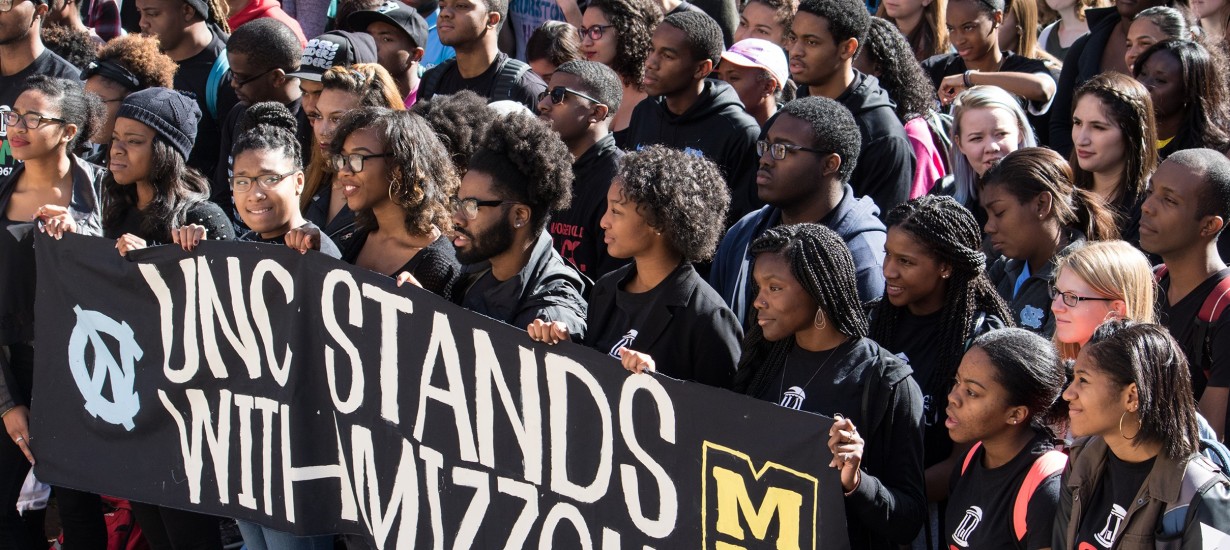UNC’s Black Students Rally After Missouri, Yale Protests

African-American students representing the Real Silent Sam Coalition, the Black Student Movement and other campus organizations held a lengthy rally Friday to air what they called long-standing grievances over the racial climate on the campus.
A noontime crowd that grew to about 300 listened to more than a dozen speakers for more than an hour and a half on the steps of South Building who decried hurtful words on public online forums, the naming of buildings for white supremacists, the University’s handling of a recent Confederate flag rally on the campus and the general atmosphere for black students that makes them uncomfortable and even fearful.
The event began with a passionate chant-and-response: “It is our duty to fight. It is our duty to win. We must love and support each other. We have nothing to lose but our chains.”
The backdrop was the past week’s national news of similar airings at other schools — particularly the University of Missouri and Yale University, where rallies and clashes over free speech rights have been vocal and occasionally violent.
Several speakers declared that they stand with the Missouri students who this week forced the university’s president and its chancellor to resign in the wake of specific events of racial insensitivity. Signs at the rally read “UNC Stands With Mizzou” and “We Could Be Mizzou.”
The Carolina rally was punctuated with strong language and some angry shouting — one speaker yelled, “I don’t support this administration” and another said, “It is hard, it is tiring to be a black person in 2015. … Administration, this is your call to action.” But it was peaceful and orderly. Unlike the actions at Missouri and Yale, news media were welcomed, not shunned.
Several high-ranking UNC administrators attended, including Chancellor Carol L. Folt. None spoke, nor were they invited to. Uniformed campus police officers, usually seen on the outskirts of such an event, were not present.
Shelby Dawkins-Law ’11 (’13 MA), who is still a graduate student, said she was deeply disturbed by the flag rally on Oct. 25. Organized by fans of the Silent Sam Confederate monument, it featured a flag-waving procession. The singing of “Dixie” went up against chants calling for the removal of the statue.
Dawkins-Law said that contrary to the southern heritage celebration that was advertised, she got reports of Ku Klux Klan literature in one of the vehicles and disturbing treatment of black students at or on the fringes of the demonstration by campus police.
“I didn’t go into $150,000 debt to be terrorized at my own school,” she said.
The group did not present a specific list of complaints or demands. The rally appeared to have been built in part on the caustic national atmosphere fed by a succession of incidents between police and African-Americans; and on the long-standing grievances of the Real Silent Sam Coalition, which called in 2013 for the removal of William Saunders’ name from a campus building. Last May, the UNC trustees erased the name of the Ku Klux Klan leader and renamed the building Carolina Hall. That did not fully satisfy the students, who had wanted it renamed for the author and activist Zora Neale Hurston.
Jeremy McKellar, a senior and president of the BSM, commended the Missouri activists, and said, “Some white counterparts still have hate and evil in their hearts. This hate and racism we hoped was extinct is very much alive.”
The University administration took steps this week to acknowledge the troubled climate and try to nurture a dialogue.
Folt announced that she had appointed G. Rumay Alexander as a special assistant. A Carolina faculty member since 2003 and an award-winning, national leader in diversity and other workplace issues, Alexander is expected to “more closely integrate new and related initiatives that are arising across campus to accelerate diversity, inclusion, and family and work-life balance,” a statement said.
UNC will hold a town hall meeting from 5:30-7:30 p.m. Nov. 19 “to engage with students, faculty and staff on the issues that continue to hamper our ability to be the inclusive, inspiring and safe campus we aspire to be.”
